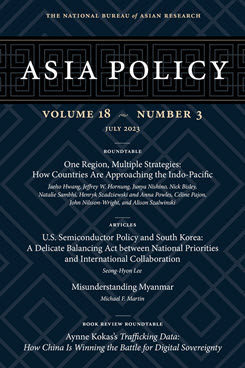Article from Asia Policy 18.3
Misunderstanding Myanmar
This article examines how, in retrospect, the military coup in Myanmar in February 2021 was a foreseeable consequence of domestic political dynamics in the country and the misperceptions of the international community about the hybrid civilian-military government.
Executive Summary
MAIN ARGUMENT
On February 1, 2021, the military in Myanmar deposed the civilian side of the hybrid civilian-military government to reassert direct military rule. The coup ignited a nationwide resistance against the new military junta, the State Administrative Council, involving many of the nation’s decades-old ethnic armed organizations (EAOs), newly created People’s Defense Forces (PDFs), and an opposition National Unity Government. Looking back, Myanmar’s military saw the 2008 constitution and its hybrid government as the end point for political reform, not as the beginning of a transition. The military’s actions during this decade reflect this. Attempts by Aung San Suu Kyi, the National League for Democracy, and the international community to foster further political changes may have been contributing factors to the military’s decision to stage a coup. Myanmar is now embroiled in a multifront civil war involving most of the country’s largest ethnic communities, including the Bamar majority, with no end in sight.
POLICY IMPLICATIONS
- Peaceful resolution of the conflict in Myanmar is not likely at this time. The U.S. and other nations should consider providing limited and targeted military assistance to the EAOs and PDFs.
- The Biden administration should expedite implementation of the authorities provided in the BURMA Act, including the provision of nonlethal assistance to the EAOs and PDFs. The U.S. State Department should rekindle its ties to the EAOs to facilitate nonlethal assistance and efforts to form local governments in areas “liberated” by the EAOs and PDFs.
- The U.S. Agency for International Development should shift the delivery of humanitarian assistance to local organizations operating in India and Thailand to more effectively provide aid to refugees and internally displaced persons from the civil war.
- The U.S. and other nations should provide financial assistance for efforts to document possible war crimes and crimes against humanity allegedly committed by the junta’s military forces and coordinate this effort with the Independent Investigative Mechanism for Myanmar, the International Criminal Court, and the International Court of Justice.
Michael F. Martin is an independent research analyst and an Adjunct Nonresident Fellow at the Center for International and Strategic Studies (United States). From 2007 to 2021, Dr. Martin was a specialist in Asian Affairs for the Congressional Research Service of the Library of Congress, providing Congress with political and economic analysis of the People’s Republic of China, Hong Kong, Burma/Myanmar, and Vietnam. From 1994 to 1998, he was the assistant chief economist for the Hong Kong Trade Development Council. Prior to this, Dr. Martin taught at Hong Kong Baptist University, Doshisha University, Colby College, and Tufts University. He holds a PhD in economics from the University of Massachusetts, Amherst.
About Asia Policy
Asia Policy is a peer-reviewed scholarly journal presenting policy-relevant academic research on the Asia-Pacific that draws clear and concise conclusions useful to today’s policymakers. Asia Policy is published quarterly in January, April, July, and October and accepts submissions on a rolling basis. Learn more


